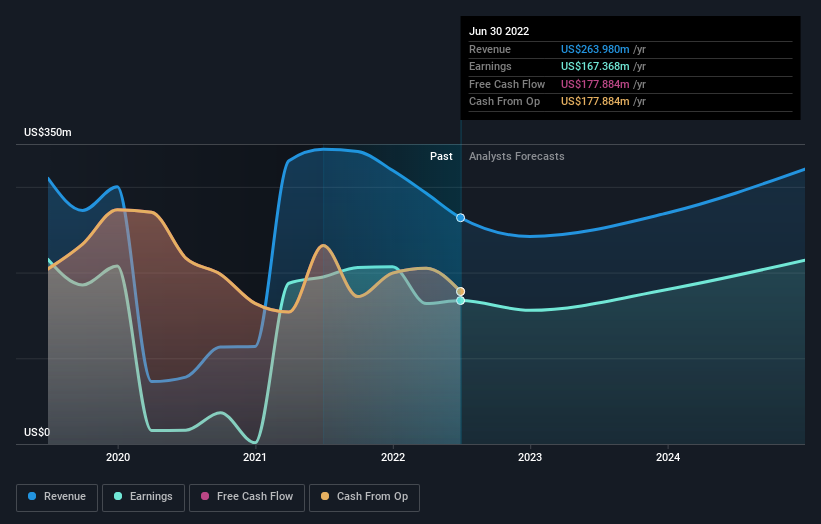To get a sense of who is truly in control of Apollo Commercial Real Estate Finance, Inc. (NYSE:ARI), it is important to understand the ownership structure of the business. With 58% stake, institutions possess the maximum shares in the company. That is, the group stands to benefit the most if the stock rises (or lose the most if there is a downturn).
Since institutional have access to huge amounts of capital, their market moves tend to receive a lot of scrutiny by retail or individual investors. Hence, having a considerable amount of institutional money invested in a company is often regarded as a desirable trait.
Let's delve deeper into each type of owner of Apollo Commercial Real Estate Finance, beginning with the chart below.

What Does The Institutional Ownership Tell Us About Apollo Commercial Real Estate Finance?
Institutions typically measure themselves against a benchmark when reporting to their own investors, so they often become more enthusiastic about a stock once it's included in a major index. We would expect most companies to have some institutions on the register, especially if they are growing.
As you can see, institutional investors have a fair amount of stake in Apollo Commercial Real Estate Finance. This suggests some credibility amongst professional investors. But we can't rely on that fact alone since institutions make bad investments sometimes, just like everyone does. It is not uncommon to see a big share price drop if two large institutional investors try to sell out of a stock at the same time. So it is worth checking the past earnings trajectory of Apollo Commercial Real Estate Finance, (below). Of course, keep in mind that there are other factors to consider, too.

Institutional investors own over 50% of the company, so together than can probably strongly influence board decisions. Hedge funds don't have many shares in Apollo Commercial Real Estate Finance. Looking at our data, we can see that the largest shareholder is BlackRock, Inc. with 17% of shares outstanding. In comparison, the second and third largest shareholders hold about 11% and 6.0% of the stock.
After doing some more digging, we found that the top 15 have the combined ownership of 51% in the company, suggesting that no single shareholder has significant control over the company.
While studying institutional ownership for a company can add value to your research, it is also a good practice to research analyst recommendations to get a deeper understand of a stock's expected performance. There are a reasonable number of analysts covering the stock, so it might be useful to find out their aggregate view on the future.
Insider Ownership Of Apollo Commercial Real Estate Finance
The definition of company insiders can be subjective and does vary between jurisdictions. Our data reflects individual insiders, capturing board members at the very least. The company management answer to the board and the latter should represent the interests of shareholders. Notably, sometimes top-level managers are on the board themselves.
Most consider insider ownership a positive because it can indicate the board is well aligned with other shareholders. However, on some occasions too much power is concentrated within this group.
Our data suggests that insiders own under 1% of Apollo Commercial Real Estate Finance, Inc. in their own names. However, it's possible that insiders might have an indirect interest through a more complex structure. It's a big company, so even a small proportional interest can create alignment between the board and shareholders. In this case insiders own US$7.7m worth of shares. Arguably, recent buying and selling is just as important to consider. You can click here to see if insiders have been buying or selling.
General Public Ownership
The general public-- including retail investors -- own 36% stake in the company, and hence can't easily be ignored. This size of ownership, while considerable, may not be enough to change company policy if the decision is not in sync with other large shareholders.
Private Company Ownership
It seems that Private Companies own 6.0%, of the Apollo Commercial Real Estate Finance stock. It might be worth looking deeper into this. If related parties, such as insiders, have an interest in one of these private companies, that should be disclosed in the annual report. Private companies may also have a strategic interest in the company.
Next Steps:
It's always worth thinking about the different groups who own shares in a company. But to understand Apollo Commercial Real Estate Finance better, we need to consider many other factors. Case in point: We've spotted 2 warning signs for Apollo Commercial Real Estate Finance you should be aware of.
But ultimately it is the future, not the past, that will determine how well the owners of this business will do. Therefore we think it advisable to take a look at this free report showing whether analysts are predicting a brighter future.
NB: Figures in this article are calculated using data from the last twelve months, which refer to the 12-month period ending on the last date of the month the financial statement is dated. This may not be consistent with full year annual report figures.
Have feedback on this article? Concerned about the content? Get in touch with us directly. Alternatively, email editorial-team (at) simplywallst.com.
This article by Simply Wall St is general in nature. We provide commentary based on historical data and analyst forecasts only using an unbiased methodology and our articles are not intended to be financial advice. It does not constitute a recommendation to buy or sell any stock, and does not take account of your objectives, or your financial situation. We aim to bring you long-term focused analysis driven by fundamental data. Note that our analysis may not factor in the latest price-sensitive company announcements or qualitative material. Simply Wall St has no position in any stocks mentioned.
The views and opinions expressed herein are the views and opinions of the author and do not necessarily reflect those of Nasdaq, Inc.



%C2%A0%20%7C%20Nasdaq&_biz_n=0&rnd=632293&cdn_o=a&_biz_z=1743342278010)

%20is%20largely%20controlled%20by%20institutional%20shareholders%20who%20own%2058%25%20of%20the%20company%20%7C%20Nasdaq&_biz_n=2&rnd=626591&cdn_o=a&_biz_z=1743342278010)
%20is%20largely%20controlled%20by%20institutional%20shareholders%20who%20own%2058%25%20of%20the%20company%20%7C%20Nasdaq&rnd=518401&cdn_o=a&_biz_z=1743342278014)
%20is%20largely%20controlled%20by%20institutional%20shareholders%20who%20own%2058%25%20of%20the%20company%20%7C%20Nasdaq&_biz_n=2&rnd=626591&cdn_o=a&_biz_z=1743342281056)
%20is%20largely%20controlled%20by%20institutional%20shareholders%20who%20own%2058%25%20of%20the%20company%20%7C%20Nasdaq&_biz_n=2&rnd=626591&cdn_o=a&_biz_z=1743342281057)